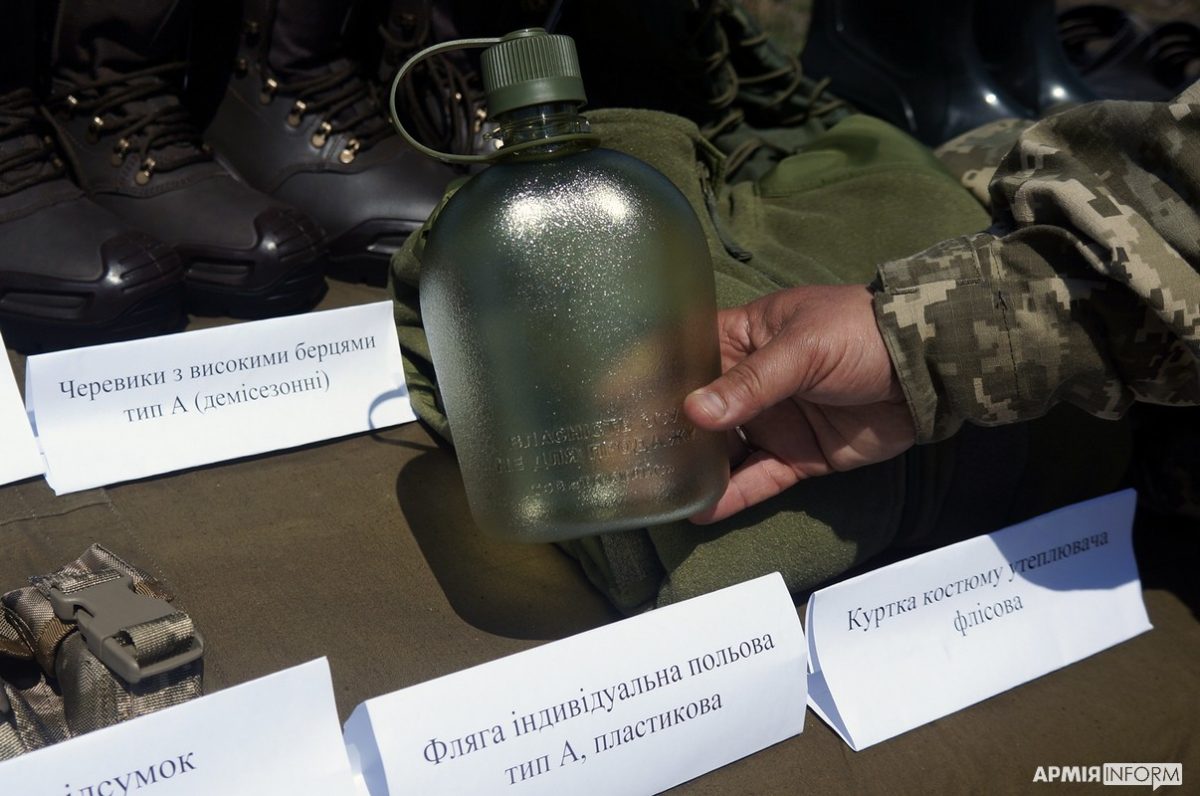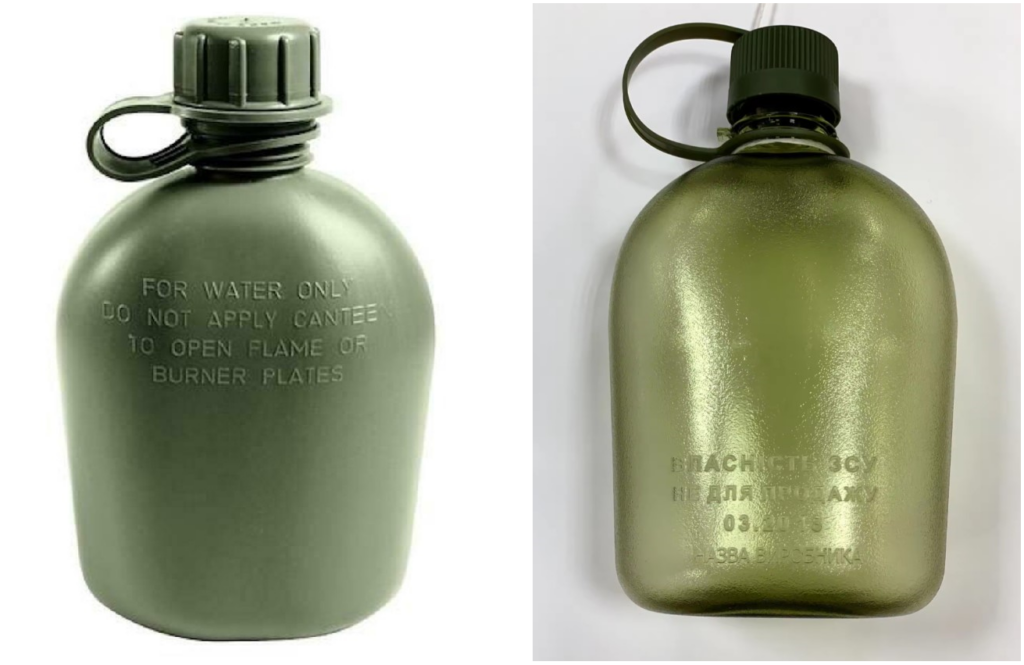The Ministry of Defense purchases plastic army flasks for the Armed Forces of Ukraine at least three times more expensive than their market price. This year alone, the State Logistics Operator (SLO), a state agency established a few months ago, spent more than UAH 54 million to procure 153,000 army flasks.
An ordinary plastic 1-liter flask cost taxpayers UAH 255, although similar American-style flasks are freely sold for UAH 120, and the alternatives can be found for UAH 72.
Why is it so expensive and who is making money on it? NGL.media spent several weeks looking into this strange pricing.
This year, the State Logistics Operator (SLO), a state-owned enterprise of the Ministry of Defense that procures for the non-lethal needs of the Armed Forces, has tried to purchase plastic flasks for the Armed Forces four times. The first two procurements under the simplified procedure in January and April were cancelled. Three different companies took part in these auctions and all of them were ready to sell 100 thousand flasks for less than UAH 20 million, but the customer rejected all offers. One of the reasons was the absence of certificates of compliance with the technical specification of the Ministry of Defense, and this is an important point to which we will return.
The tender could have been announced for the third time, but instead, the SLO decided to conclude a direct agreement with Coltrane LLC, and the total value of the transaction almost doubled to UAH 35,5 million. Previously, this company did not sell flasks (or any other plastic products) to public procuring entities and did not participate in the cancelled procurements.

A plastic flask for the Armed Forces of Ukraine, created according to the technical requirements of the Ministry of Defense (photo by Army Inform)
A few weeks later, in June, SLO concluded another agreement with Superform LLC for 53 thousand flasks for almost UAH 18,8 million using the simplified procurement procedure. In this case, one plastic flask cost only one hryvnia less than in the case of Coltrane, UAH 354 versus UAH 355.
About the supplying companies
The companies the Ministry of Defense signed agreements with raise doubts. In particular, both companies are quite new and started receiving orders worth hundreds of millions of hryvnias just after they began their operation. The owners of these companies also raise questions.
For example, Superform LLC, founded six months ago by Vladyslav Lykhosenko from Zaporizhzhia, 27, signed five agreements with the National Guard and the Defense Ministry for almost UAH 310 million in the last two months alone YouControl data.

Vladyslav Lykhosenko (Facebook photo)
Vladyslav Lykhosenko previously attempted working with the Ministry of Defense, but it ended badly. He founded “Professional Equipment LLC” in 2022, and it went bankrupt a year later. The company was left with UAH 410 thousand in debt to suppliers and more than UAH 970 thousand in fines for late deliveries to the Ministry of Defense under four contracts concluded in April and May 2022 (one, two, three, four). Back then, defense contracts were not published in the Prozorro system, and NGL.media learned about them from the court register.
Lykhosenko managed to flee the sinking company in time. Just a month before the bankruptcy case was launched, he transferred “Professional Equipment LLC” to Andrii Ivanov, and soon founded “Superform LLC”. The new company with an unblemished reputation allowed Lykhosenko to continue his cooperation with the Ministry of Defense and the National Guard.
Vladyslav Lykhosenko did not want to talk to NGL.media about his companies’ defense contracts and ignored the questions we sent him by e-mail.
Another Defense Ministry contractor, Coltrane LLC, also has an interesting history. Officially, this company was founded five years ago by Olha Chubenko and Lidiia Khomenko, who have hundreds of companies in Ukraine registered in their names. For example, Olha Chubenko is listed as the owner of 1166 companies In 2019, Chubenko was number one in the Corporate News Agency ranking of the owners of the largest number of companies her partner Lidiya Khomenko is listed in 68 companies data from the NACP’s search engine Hidden Interests. As a rule, such mass registration is carried out to use companies in various dubious transactions.
Coltrane started receiving real contracts only this year, shortly after Yulia Kykot became the official owner of the company. Yulia Kykot signed the first agreement with the SLO for UAH 41,6 million in March, when her company won a simplified procurement procedure to supply 100 thousand flask covers. Among 11 bidders, Coltrane’s offer was not the cheapest, but the customer rejected the offers of bidders with lower prices.
Three times better – three times more expensive
The market for army flasks in Ukraine is represented mainly by flasks designed by the US Army, which have proven their worth in many military conflicts. Most often, “American” flasks retail for UAH 120, but we managed to find them for UAH 72.
However, the Ukrainian Ministry of Defense decided to develop its own standard for flask, based on the same US Army flask. The obvious differences are the translucent plastic and the inscription “Property of the Armed Forces of Ukraine, not for sale”; the less obvious ones are the slightly different threads on the lid and the loop holder.

American (left) and Ukrainian (right) one-liter army flasks
As a result, all flasks purchased by the Ministry of Defense must conform to the approved master sample and technical specifications. This must be supported by a certificate of conformity issued by the Central Directorate for Logistics Development and Support of the Armed Forces of Ukraine.
Are such conditions for participation in tenders justified? After all, as a result, notionally Ukrainian flasks (because they are ordered in China anyway) cost at least three times more than NATO-standard flasks.
Winners’ manufacturer
Both companies the SLO signed agreements with do not have their own production facilities and order flasks from China, from one manufacturer, Taizhou Huangyan Sigg Mold Co., Ltd.
“The main criterion for us was that these flasks should comply with the product specification (inv. No.198), as this makes it possible to sell them to the Armed Forces of Ukraine, which is one of the priority areas of our activity,” explains Yulia Kykot, Director of Coltrane LLC, in her letter to NGL.media. “Having conducted a number of tests on flasks from various manufacturers, including Ukrainian ones, we were convinced that only the flasks produced by Taizhou Huangyan Sigg Mold Co., Ltd complied with the product specification, which was the reason to buy these flasks”.
The production facility of Taizhou Huangyan Sigg Mold Co., Ltd is located in Taizhou on the east coast of China. The promotional photo of this company on the Alibaba.com marketplace shows the same Ukrainian flask made of translucent olive-colored plastic with the inscription “Property of the Armed Forces of Ukraine, not for sale” for USD 3.85. (UAH 154) per piece provided the order is 1,000 pieces or more and the date of manufacture is March 2018. Interestingly, the Ukrainian Ministry of Defense officially approved the product specification for this flask only in June 2018.
Similar flasks, without inscriptions, are sold by the Chinese through Alibaba.com for USD 2.5 (UAH 100) per piece, and American-style flasks made of opaque plastic go at USD 0.73 (UAH 29) per piece.
How much did the intermediaries earn?
NGL.media made an attempt to order another 100 thousand flasks for the Ukrainian army from Taizhou Huangyan Sigg Mold Co., Ltd, but for some reason the company’s manager, Lucy Chea, was not interested in the request and did not want to bargain. However, even without bargaining, profit received from such a batch of flasks, including transportation to Ukraine and payment of all taxes and fees, will start from UAH 12 million flasks at USD 3.85 per piece, provided you can sell them to the Ministry of Defense at the same price as Coltrane and Superform, up to UAH 15 million flasks at USD 2.5 per piece.
However, a small experiment by NGL.media shows that the real profits of suppliers can be much higher.
We decided to contact other manufacturers. Within an hour after registering on Alibaba.com, NGL.media received a dozen commercial offers for 100 thousand flasks complying with the Ministry of Defense specification. We intentionally did not choose the most cost-efficient one, but negotiated with a random Chinese company Staush Chengdu Taoxu Technology Co., Ltd, which specializes in the manufacture of beverage containers.
According to the specification of the Ministry of Defense, the flasks must be made of Copolyester TX1001 polyester Eastman Tritan™ Copolyester ТХ1001 Patent plastic by the American company Eastman Chemical, created in 2007. It is used primarily in the manufacture of bottles and flasks for drinking or its equivalent. After agreeing on the technical aspects, Staush manager Kee Iris estimated the batch of 100 thousand flasks at between UAH 4,7 million and UAH 8,7 million, depending on the type of plastic.
Taking into account another UAH 6,500,000 of transportation costs and taxes, the cost of such a batch of flasks in Ukraine will increase to UAH 11-15 million. Thus, Coltrane’s net profit can be estimated at UAH 20-24 million. “Superform, given the smaller batch, could have earned UAH 10-11 million. In both cases, the margin reaches around 200%.
Unrealistic delivery date
Under the terms of the original agreement, Coltrane was supposed to deliver a batch of flasks to the SLO within 19 days after conclusion of the contract, and then the delivery period was extended by another 15 days. However, in the real world, it would take at least four and a half months to manufacture 100,000 flasks in China and deliver them to a warehouse in Ukraine.
Therefore, the only way to meet the delivery date specified in the contract is to have the flasks of the required model in stock in Ukraine at the time of signing the contract.
The owner of Coltrane LLC, Yulia Kykot, actually confirmed this was the case. If the deal with DOT had fallen through for some reason, the company intended to offer these flasks to other customers.
“If we failed to sign an agreement with the SLO, Coltrane managers would contact the National Guard of Ukraine, units of the Armed Forces of Ukraine, and the State Border Guard Service and negotiate with them”, says Yulia Kykot. “In addition, the company would regularly monitor procurements for such goods by the SLO and other entities”.
Interestingly, the National Guard orders American-type flasks for UAH 198 per piece. However, last year the border guards actually bought them at about the same price as the Ministry of Defense. However, the products for the army have an embossed inscription “Property of the Armed Forces, not for sale,” so it is unlikely that anyone other than the Defense Ministry would buy them. It turns out that 100,000 flasks can be purchased in advance either with a guarantee of a contract or by unnecessarily risking several million hryvnias.
Support NGL.media!
Even small donations make big investigations possible
P.S. The next day after this investigation was published, the State Logistics Operator sent an additional explanation to NGL.media, in which it admitted that the flasks could have been purchased at much lower prices, but the lack of conformity certificates from the Main Department of Development and Support of Logistics of the Armed Forces of Ukraine prevented this.
“We contract only those suppliers who provide us with the entire list of required documents as stipulated by law. Otherwise, the SLO would be directly violating the requirements, despite the fact that it can be a bargain price for the state”, the SLO letter reads. “Being aware of the gaps in the system, the SLO regularly provides suggestions to the State Committee for the State Service for Regional Development of Ukraine to improve and correct errors in the technical specifications”.
The full viewpoint of the SLO after the NGL.media investigation is available here.

